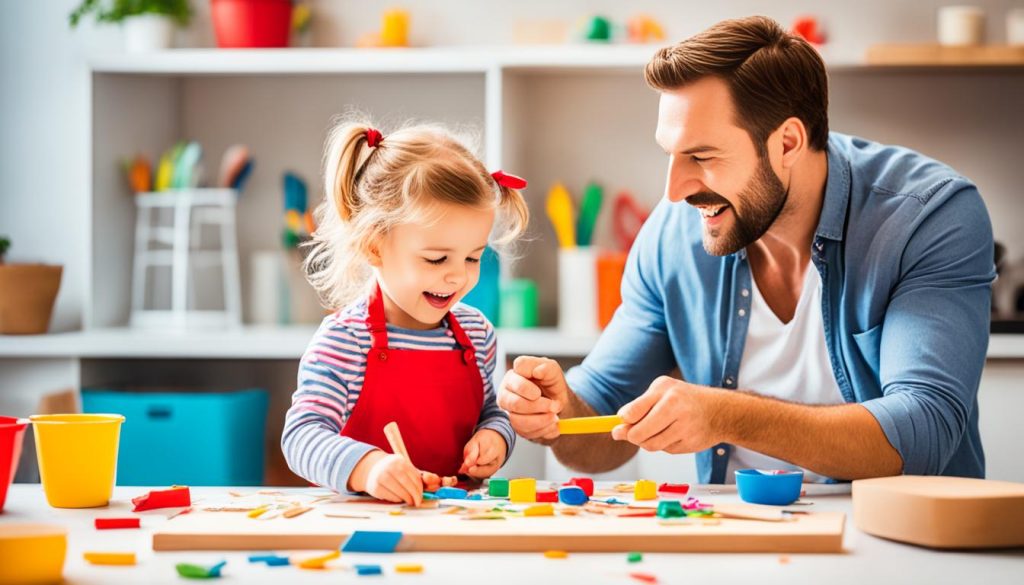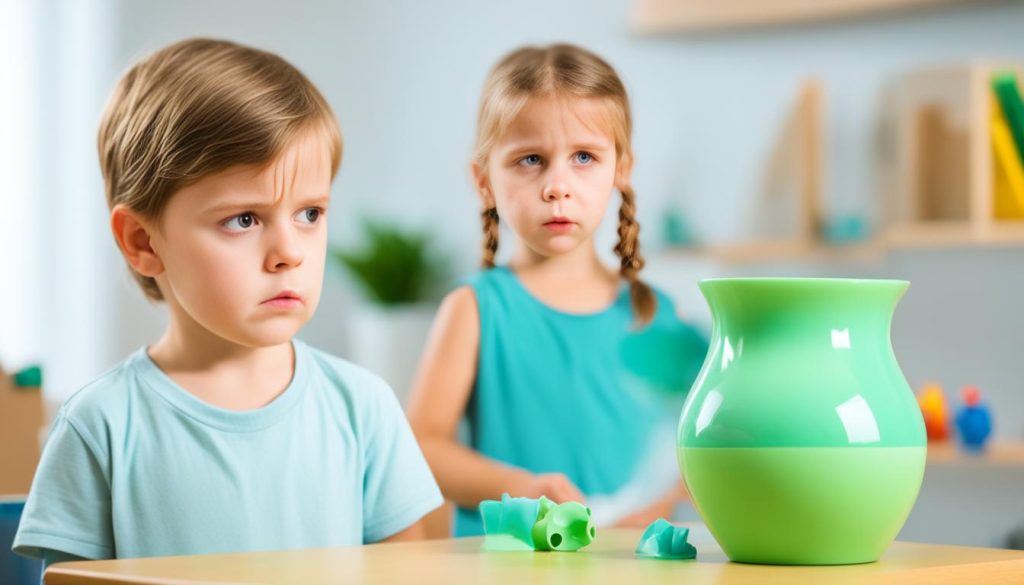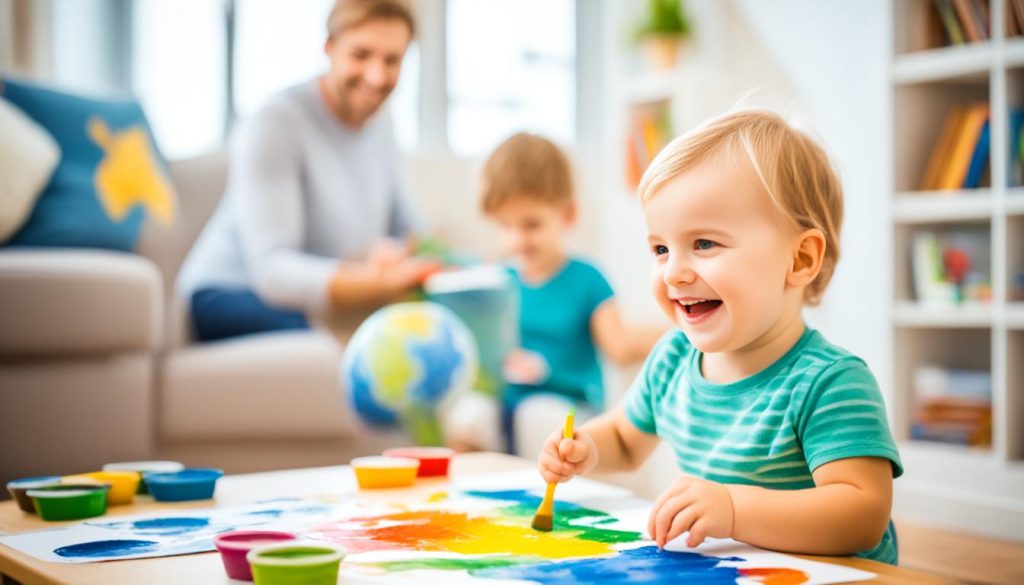Imagine your five-year-old beaming with pride after tying their shoes for the first time. Moments like these are key to building self-esteem. As parents, your role in boosting confidence through positive reinforcement is vital. It’s about praising achievements and supporting them in learning.
Seeing the joy on your child’s face when they achieve something new is special. Their sense of pride comes from the task and the belief in themselves. Building self-esteem means nurturing them, letting them try and make mistakes, and celebrating every win, big or small.
Studies show that valuing your child and supporting them builds their emotional safety and confidence. When kids feel valued, they grow up with a strong sense of self-worth and resilience.
Key Takeaways:
- Positive reinforcement parenting builds a child’s self-esteem and sense of self-worth.
- Celebrating small milestones supports emotional safety and resilience.
- Encouraging children to embrace their uniqueness promotes confidence.
- Parenting with constant support helps children navigate social pressures.
- Engaging in daily conversations about self-value fosters a positive self-image.
Model Confidence By Tackling New Tasks
Parents are key in helping their kids feel confident. They do this by showing them how to be self-assured. When parents try new things with hope and careful planning, they set a good example. This helps kids learn the value of positive parenting and Emotional Intelligence.
Show Optimism and Preparation
When parents show a positive attitude and are well-prepared for new challenges, it changes how kids see their own abilities. Seeing parents tackle tasks with hope and readiness encourages kids to do the same. This not only helps in talking better with their parents but also makes them feel okay with trying new things without fear.

Acknowledge and Overcome Anxiety
It’s important to talk about feeling anxious in a helpful way. By sharing their own worries and finding ways to deal with them, parents teach kids that it’s okay to feel nervous. This openness helps kids understand they can handle their feelings. It also shows the need to limit screen time to reduce stress and improve emotional health.
In conclusion, showing confidence by trying new things, being hopeful, and facing fears can really help your child feel good about themselves. Using these methods with good communication and positive parenting helps kids feel ready to try, learn from mistakes, and grow into confident adults.
- Kids learn new skills rapidly from birth
- Mastery and learning from failures build confidence
- Diversifying skills increases feelings of capability
- Trial and error is essential for growth
- Resilience is key for confidence
- Exploring personal interests boosts self-esteem
- Setting and achieving goals fosters strength and confidence
- Praising effort, not just outcomes, is crucial
- Age-appropriate responsibilities enhance sense of value
- Accepting imperfection fosters confidence
- Balancing challenges and successes boosts confidence
- Unconditional love bolsters self-worth
- Encouraging new challenges increases self-confidence
- Positive self-talk and reflection enhance confidence
- Constructive feedback improves self-esteem
Allow Kids to Learn From Mistakes
Learning from mistakes is key to raising confident, self-sufficient kids. By teaching them responsibility and discipline, you help them grow from their experiences. This way, they become more independent and creative, ready to face challenges head-on.
Emphasize Learning, Not Perfection
Focus on learning, not being perfect, to show kids that mistakes are normal. This shift helps them see every mistake as a chance to learn. Research by Dweck (2012) shows this mindset builds resilience and determination, key for success.
Encourage Resilience and Perseverance
Teach kids the value of learning from mistakes to build resilience and perseverance. Studies like Jones et al. (2018) prove that overcoming challenges makes us stronger. Encouraging them to think critically about their choices helps them value their experiences.

- Acknowledging mistakes without justifying them sets a good example.
- Effective discipline strategies teach kids about their actions’ consequences.
- Encouraging independence helps them deal with setbacks alone.
- Boosting creativity lets them find new ways to solve problems.
Letting kids learn from their mistakes prepares them for life’s challenges. They learn that failures lead to success, making them more resilient. This way, they’re not afraid of not being perfect.
Teaching kids responsibility makes them accountable adults. It also builds their self-esteem for life. Seeing mistakes as chances to learn promotes a healthy view of failure and success. This approach supports their growth now and in the future.
Encourage Diversifying Skills and Interests
Encouraging kids to try different activities is good for their mental health. It makes them curious and keeps them learning throughout their lives. This helps them learn to be thankful for different experiences and views.

Trying new things also helps kids grow mentally. When they face different challenges, they become more flexible and strong. This is key for doing well in a changing world and staying emotionally healthy.
Here are some ways to help your child explore new skills and interests:
- Expose them to various extracurricular activities such as sports, arts, or music.
- Encourage them to join in community events to learn about diversity and inclusion.
- Give them books and toys that show different abilities and skin colors.
- Practice gratitude as a family to build a sense of thankfulness together.
Studies show that teaching kids empathy starts early. Parents can show them how to be kind, caring, and welcoming. This helps kids stay mentally healthy and prepares them for a life of learning and growth.
The table below shows how diversifying skills helps through different programs and efforts:
| Program | Details |
|---|---|
| Curriculum Framework | Launched in September 2021 and December 2022 for parents of kindergarten and primary students. |
| Parent Education for NCS | Started in the 2020/21 school year, catering to non-Chinese speaking parents. |
| Special Educational Needs Resources | New pamphlets available in Chinese, English, and eight ethnic minority languages. |
| Playtime with Children | 18 roving exhibitions to promote parent-child interaction. |
| Play with Your Children Day | Event with participation from around 200 students and their parents. |
| Call for Parent-Child Games | Activity planned from January to June 2023. |
By encouraging a love for learning and new experiences, you help kids develop a variety of skills. This makes them more adaptable. Support your child in finding different interests to help them grow into a confident and well-rounded person.
Help Kids Articulate and Achieve Goals
Helping children set and reach their goals boosts their self-confidence and independence. This means setting clear goals, praising their hard work, and encouraging them to keep going. By teaching kids about hard work and healthy habits, we help them become resilient and focused on their goals.
Set Realistic and Measurable Benchmarks
Setting clear goals helps kids see how to reach their dreams. For example, supporting their hobbies sets benchmarks for skill growth. This approach helps kids learn to handle challenges and see their progress. Making goals achievable keeps them motivated and interested.
Validate their Efforts and Encourage Persistence
It’s key to praise and support kids as they work towards their goals. Acknowledging their hard work teaches them the value of perseverance. Seeing their efforts rewarded encourages them to keep going, even when things get tough. This builds healthy habits and shows the value of consistent effort.

| Parental Aspiration | Percentage of Parents |
|---|---|
| Aspirations for success in various areas (academics, sports, etc.) | 80% |
| Emphasis on developing skills for community activities | 65% |
| Instilling values like respect, fairness, and justice | 45% |
| Aim to build resilience and problem-solving abilities | 70% |
| Encouraging children to seek assistance when needed | 60% |
| Hopes for children to become independent | 30% |
| Wishing for children to find loving life partners | 40% |
| Aspiring for children to pursue dreams related to travel, study, career | 25% |
| Aim for children to participate in family and friends’ milestones | 50% |
By guiding kids to set goals, supporting their healthy habits, and teaching persistence and hard work, we boost their chances for success.
Praise Efforts and Hard Work, Not Just Results
Positive reinforcement parenting means praising children for their efforts and hard work, not just their results. This approach helps them focus on their actions and attitudes. It encourages a growth mindset and supports independence.
Focus on Specific Actions and Attitudes
When you praise specific actions and behaviors, your words mean more. For example, say “You worked really hard on that math problem” instead of “You’re so smart.” This way, you avoid linking their worth to just being smart. It also teaches them the value of hard work.
A study at Columbia University showed that praising kids for being smart can make them less resilient after failure. But praising their effort made them more interested in learning and resilient.
Be Genuine and Honest in Your Praise
Being real and honest in your praise teaches kids about respect and empathy. Praising their hard work and responsible choices shows the value of learning. It’s key to praise specific actions with feedback to make them feel valued and keep doing well.
This approach also helps with sibling rivalry. By truly noticing each child’s efforts, you create a respectful and understanding home. Kids praised for their effort see failures as a chance to work harder, not as a fixed trait.
The table below shows how specific praise beats generic praise:
| Focus-Specific Praise | Generic Praise |
|---|---|
| Enhances resilience and perseverance. | Can make children more cautious and fearful of failure. |
| Encourages a growth mindset. | Potentially demotivates children when facing challenges. |
| Helps children feel valued and motivated. | Children may rely on rewards or external validation. |
| Promotes independence and self-esteem. | Can decrease confidence and persistence. |
Using praise that focuses on effort and actions builds a strong base for your children’s future. Positive reinforcement parenting creates a supportive and growth-focused home for your kids.
Avoid Over-Critical Comments
It’s important to give feedback that helps your child feel good about themselves. Instead of just pointing out what’s wrong, focus on what they can do better. Start with something positive to make them feel confident and proud.
Encourage Positive and Constructive Feedback
When you talk to your kids, make sure it’s positive and helpful. Don’t just criticize; praise their hard work and wins. This helps them be creative and feel safe to share their thoughts.
Focus on Improvement and Future Actions
Your advice should guide them on how to get better. Talk about the tough parts of dealing with tantrums and how they can do things differently next time. This way, they learn to think ahead and stick to family values.
By being kind and focusing on the positive, you make a supportive space for your kids. This balance is key in handling tantrums and boosting their creativity. It helps them feel good about themselves and grow emotionally.
Provide Opportunities for Success
It’s important for your kids to have chances to succeed. This boosts their confidence and helps them grow. Active parents are key in showing kids how to do well in school.
Give your kids activities where they can easily succeed. This makes them feel good about themselves and prepares them for harder challenges later.
Parents play a big role in making a supportive home for learning. They help manage screen time and work with teachers. Talking with teachers at conferences is good, but more ways for parents to connect with teachers can help a lot.
Schools with fewer students per teacher can offer better mentorship. This helps kids develop social skills.
Managing screen time is key. Mix learning with fun activities. Teach kids to follow routines, simplify their schedules, and focus on one task at a time. This helps them manage their time well.
Play is very important for kids. It lets them explore, be creative, and make friends. Studies show rewards and punishments don’t always work well. Instead, focus on helping kids believe they can grow and learn, which helps them succeed in life.
To give kids structured but fun chances to succeed, try these ideas:
- Do activities alone and with others to teach teamwork and independence.
- Offer different tasks that match their interests and skills, making everyone feel important.
Getting kids ready for kindergarten means making a learning space that’s both challenging and fun. This approach improves their school performance and boosts their happiness and well-being.
Teach the Importance of Family Contributions
Teaching kids about family contributions helps them feel responsible. It also teaches them about loyalty, trust, and teamwork. When kids know their role in the family, they feel they belong and their self-esteem grows.
Assign Age-Appropriate Responsibilities
It’s important to give kids tasks that fit their age. Little ones can start with easy jobs like cleaning their toys. Older kids can do harder tasks like setting the table or helping cook.
These tasks teach kids about outdoor play and doing things on their own. They learn the value of helping the family.
- For Toddlers (3-5 years):
- Picking up toys
- Placing dirty clothes in the laundry hamper
- Feeding pets with supervision
- For Young Children (6-9 years):
- Setting the table
- Watering plants
- Helping fold laundry
- For Preteens (10-12 years):
- Taking out the trash
- Vacuuming the house
- Assisting with meal preparation
- For Teenagers (13+ years):
- Cooking simple meals
- Running errands
- Babysitting younger siblings
Highlight the Value of Being Needed
Telling kids how important their help is makes them feel proud. It shows them they are valued. This boosts their confidence and teaches them to be kind.
It also helps them understand different viewpoints and tasks. This teaches them to value diversity.
| Age Group | Responsibility | Benefit |
|---|---|---|
| Toddlers | Picking up toys | Simplicity teaches order |
| Young Children | Setting Table | Promotes teamwork |
| Preteens | Vacuuming | Encourages commitment |
| Teenagers | Cooking Meals | Develops life skills |
By using these methods, you teach kids the value of their efforts. This builds responsible citizenship skills. It also helps them understand the importance of family and boosts their self-esteem.
Model Positive Parenting: Setting Boundaries with Kids
Positive parenting in today’s digital world means setting clear, consistent rules. This helps kids grow healthy and strong. By setting boundaries, kids feel safe and valued.
Clear and Consistent Rules
Clear and consistent rules are key to good discipline. They should fit the child’s age, be easy to understand, and always applied. This makes kids know what’s expected and keeps them feeling secure.
Studies show that supportive parenting, with clear rules, helps kids adjust better in school and behave better. This is true even by sixth grade. So, clear rules are vital for positive reinforcement parenting and good discipline.
Balanced Discipline Strategies
Good discipline mixes being firm with being flexible. It aims to teach kids to respect rules without fearing punishment. Using positive reinforcement parenting methods can really help kids behave better and feel better, as seen in a study where 79% of parents noticed big improvements.
Positive parenting is linked to many good things for kids. It helps them from being young, and even as they get older. With balanced discipline, kids learn to follow social rules and keep a strong sense of self.
Here is a table showing how positive parenting helps:
| Benefits | Statistics |
|---|---|
| Improvement in Children’s Positive Behaviors | 79% (Bath Spa University, 2016) |
| Positive School Adjustment and Fewer Behavioral Problems | Pettit, Bates, and Dodge (1997) |
| Healthy Child Development Outcomes | Brooks (2005) |
| Emotional and Intellectual Growth | Gottman (2019) |
| Greater Resilience in Children | Brooks & Goldstein (2001) |
Encourage Healthy and Supportive Friendships
Helping kids build strong friendships is key for their growth. Good friends boost their confidence and help with their mental health.
Highlight the Importance of Positive Social Interactions
Teaching kids good manners and healthy ways to interact helps them make strong friends. These positive experiences are great for their feelings and how they deal with problems.
Research shows that parents can really help kids get better at social skills. About 6 out of 10 kids in the U.S. form close bonds with their parents. This is important for making friends later on.
Guide Kids on Building and Maintaining Friendships
Parents can help kids learn about making and keeping friends. By teaching them about being kind, respectful, and fair, you show them what good friendships are like. Spending quality time together, where the child leads, also helps them get better at social skills.
Teaching kids to share and solve problems together sets the stage for lasting friendships. By the time they are three, kids start to manage their feelings and actions better. This early help is key as they get older and deal with more complex social situations.
Here are some ways to help your child make and keep friends:
- Encourage them to join groups and clubs.
- Teach them how to listen and understand others.
- Show them how to be kind in your own relationships.
- Set up playdates and social events.
Having good friends in childhood makes life better and prepares them for adult relationships. Parents can really shape these skills, making sure kids grow into people who can make and keep healthy friendships.
| Key Aspect | Details |
|---|---|
| Secure Attachments | 60% of U.S. children have secure bonds with parents, aiding social skill development. |
| Emotional Regulation | Children start regulating emotions around age 3, which is crucial for healthy friendships. |
| Parental Involvement | Organizing social events significantly impacts child’s social skills. |
| Learning through Play | Quality time where the child leads play strengthens parent-child bond and social skills. |
Creating a place that values healthy friendships helps kids handle social challenges. This prepares them to be socially skilled and confident.
Understand and Appreciate Each Child’s Individuality
In the world of parenting and raising kids, it’s key to know and value each child’s unique qualities. This helps build their self-esteem and emotional health. It means seeing and valuing their special traits and changing how you parent to fit these differences.
Parents who know a lot about child growth tend to use positive parenting ways. This helps them get to know their child’s unique qualities and support their emotional and social growth. When kids go through big changes, parents look for the best ways to meet their child’s special needs and behaviors.
Celebrate Unique Traits and Interests
Every child is a mix of their natural personality and what they learn. Seeing and valuing these differences helps parents support their child’s unique journey. No matter if your child is seen as “easy,” “slow-to-warm-up,” or “challenging,” celebrating their special qualities boosts their self-esteem. For example:
- Easy-going kids adjust well to new things and help make family life better.
- Slow-to-warm-up kids might need more emotional support as they get used to new places.
- Kids with challenging temperaments need patience and special strategies to handle their strong feelings in a good way.
Balance Individuality with Social Acceptance
It’s crucial to love a child’s uniqueness but also teach them to do well in social situations. This means fostering child independence and showing them the importance of getting along with others. To find a good balance, you can:
- Show them how to act right in social places, helping them learn to be socially skilled.
- Encourage them to do things where they can show their individuality and learn to respect and accept others’ views.
- Talk about diversity in a positive way at home, teaching respect and inclusivity. Knowing that kids are all different helps parents adjust their parenting to meet these needs.
By mixing celebrating unique qualities with teaching social skills, parents help their kids become confident individuals. When parenting covers both individual and social needs, kids can face life’s challenges with strength and confidence.
Conclusion
Fostering self-esteem in children is a complex task that needs a full approach. Parents play a key role by showing confidence, valuing lifelong learning, and seeing mistakes as lessons. Praising effort, not just results, is crucial for building resilience in kids. This helps kids develop a mindset that lets them tackle challenges and bounce back from failures.
Teaching kids responsibility is also vital. Giving them tasks that fit their age helps them feel important in the family. Avoiding harsh words helps them grow emotionally. Data shows 21% of parents focus on making their kids independent and expressive.
Creating chances for success, setting clear rules, and supporting friends are key. This helps build important life skills.
The journey goes beyond just parenting. It’s about celebrating what makes each child special. Parents should value their child’s unique qualities while also teaching them to fit in. By offering love and support, parents help their kids develop the confidence to handle life’s ups and downs.
FAQ
How can I raise confident kids?
How can I model confidence for my child?
How should I address my child’s mistakes?
Why is it important for children to diversify their skills and interests?
How can I help my child set and achieve goals?
What is the best way to praise my child’s efforts?
How should I offer feedback to avoid undermining my child’s confidence?
How can I provide opportunities for my child to succeed?
How can I teach my child the importance of family contributions?
What should I know about setting boundaries with my child?
How can I encourage my child to build healthy friendships?
How can I appreciate my child’s individuality?
This post contains affiliate links. If you click on a link and make a purchase, I may earn a small commission — at no extra cost to you. Thank you for supporting this blog and helping me keep the patterns free! Read the full Affiliate Disclosure & Transparency.
